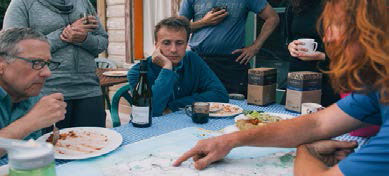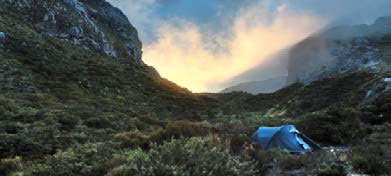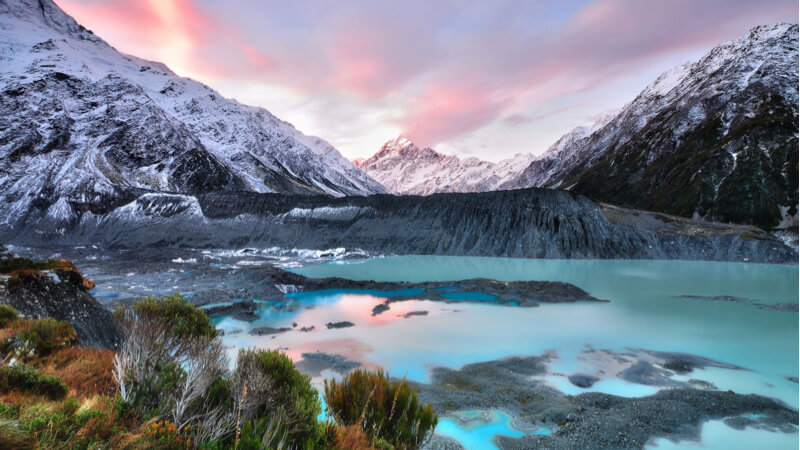Ultimate Mt Cook National Park And Gillespie Pass Adventure Challenge
This is the ultimate adventure challenge.
A camping and backcountry hut experience in the South Island of New Zealand. Hike through some of New Zealand’s finest scenery. A stunning few days are spent in the awe inspiring Aoraki/Mt Cook National Park where you will be rewarded with views of impressive peaks, glaciers and valleys. Then we head south to Mt Aspiring National Park which is further into the alpine paradise of the Southern Alps. Spend the next three nights enjoying this outstanding location.
Overview
This is the ultimate adventure challenge.
A camping and backcountry hut experience in the South Island of New Zealand. Hike through some of New Zealand’s finest scenery. A stunning few days are spent in the awe inspiring Aoraki/Mt Cook National Park where you will be rewarded with views of impressive peaks, glaciers and valleys. Then we head south to Mt Aspiring National Park which is further into the alpine paradise of the Southern Alps. Spend the next three nights enjoying this outstanding location.
Day 00
ARRIVAL INTO CHRISTCHURCH
On your arrival into Christchurch make your way to the group accommodation. Accommodation: Camelot Motor Lodge
Day 01
CHRISTCHURCH TO MT COOK
1.5 hours hiking
We depart from Christchurch around 8.00am and commence our drive south to Lake Teka- po, famous for its stunning turquoise waters and the quaint Church of the Good Shepherd. On arriving at Lake Tekapo we hike up through wilding conifers and tussock grasslands to the summit of Mt John and revel in the 360-degree views of the Patagonia-like landscape. The sweeping Mackenzie Basin is a sparsely populated region with tawny-brown drylands, braided riverbeds and startling glacial lakes extending to the horizon.We arrive at Mt Cook Village in the late afternoon and then relax and enjoy breath-taking views of New Zealand’s highest mountain, Aoraki/Mt Cook (3,724 metres). We spend the next two nights in the heart of the Southern Alps surrounded by that special kind of silence that only big mountains can command.
Accommodation: Mountaineer’s Lodge. Includes lunch and dinner.
Day 02
MT COOK
6-8km / 6 hours hiking
We hike to Sealy Tarns and onto Mueller Ridge. Just when you think you have taken the most impressive photo possible of the Hooker Valley and Mt Cook Range you will be rewarded with the mirror reflections of the peaks in the glorious Sealy Tarns. Take some time to rest at the tarns and absorb the impressive peaks and valleys. From the tarns we then hike steeply onto Mueller Ridge. From here the vista encompasses the Mueller Glacier and Mt Sefton. As we return to the village by the same route we will meet up again with anyone who stayed on at the tarns, for the descent.There is time in the afternoon to visit the Information Centre. This is a great place to be inspired by the courageous stories of pioneering mountaineers and to learn about the Park’s natural history.
Accommodation: Mountaineer’s Lodge. Includes breakfast, lunch and dinner.
Day 03
4km / 2 hours hiking 38 km / 3 hours biking
After breakfast, we hike steep glacial moraines to the Red Tarns, so named for the colour of their pond-weed. The vegetation changes as we climb from the valley floor to a superb panoramic viewpoint of the valleys below, the village and Aoraki/Mount Cook. On our return to the village we drive to nearby Twizel and get fitted out with bikes to ride a section of the impressive Alps to Ocean cycle Trail. We will cycle along the quiet canal roads before crossing the Lake Ohau weir and weaving our way around the lake on a purpose-built cycle track. The views are amazing and there will be time to stop, take photos and admire the mountains and the amazing blue of the glacially fed Lake Ohau. We cycle directly to Ohau Lodge where we will be staying tonight. Relax on the deck of the lodge overlooking the lake and recharge in this stunning destination.
Accommodation: Lake Ohau Lodge. Includes breakfast, lunch and dinner.
Day 04
45km / 4 hours cycling
We wake to the smell of coffee and enjoy a hearty breakfast at the lodge restaurant before getting kitted out in our cycle gear and hitting the trail. From th Lake Ohau Lodge driveway, the trail traverses the lower slopes of the Ruataniwha Conservation Park, with stunning views back across the basin to the Ben Ohau Range. We have 6km of easy cycling until the track narrows and it becomes a steady climb to the high point on the trail at 900m [11km]. Once at the high point, after a couple of false summits, it is a rolling descent and moderately technical to the historic woolshed. The support vehicle will meet us here for lunch and this will give those people that took the 14km side trip out to the Clay Cliffs a chance to catch up. After lunch we get back on our bikes and make our way out to highway, taking the off-road trail, and onto Omarama where our guide will once again meet us.
Day 05
MT COOK TO WANAKA
4km / 2 hours hiking
After breakfast, we hike steep glacial moraines to the Red Tarns, so named for the colour of their pond-weed. The vegetation changes as we climb from the valley floor to a superb panoramic viewpoint of the valleys below, the village and Aoraki/Mount Cook. On our return to the village we drive to Wanaka following the Mackenzie country south before climbing over the tussock lands of the Lindis Pass into the Southern Lakes District. Wanaka is a lovely lake-side resort town where we have the latter part of the afternoon to do as we please. There are stand-up paddleboards on the lakeshore that can be hired by the hour for a SUP experience, there is a walk up Mt Iron which is easily accessed from the town or the time can be a chance to enjoy a coffee or a beer/wine at one of the numerous establishments in this funky alpine environment. Your guide will organise a briefing time so everyone knows what to pack in their backpacks as it is a relatively early start the next day.
Accommodation: Altamont Lodge. Includes breakfast and lunch.
Day 06
WANAKA TO YOUNG HUT
20km / 7 hours hiking
We leave Wanaka early and travel past Lake Hawea and into West Coast scenery. We start our hike in Makarora and once across the Makarora River we follow the Young River. The Young Valley is a wonderland of dense native forest and high peaks. The trail steepens and climbs steadily to the tree line. The track climbs steeply for 100m and then sidles through a series of unstable slips to reach Stag Creek. From here, it’s a steady climb to Young Hut.
Accommodation: Camping or Backcountry Hut. Includes breakfast, lunch and dinner.
Day 07
YOUNG HUT TO SIBERIA HUT
12 km / 7 hours hiking
The track winds its way up the valley sidewall under the awesome east face of Mount Awful. This really is an alpine paradise with towering mountains as our backdrop. The track climbs steeply alongside a rock bluff onto a snow grass spur that after 3 to 4 hours, leads to the pass. The climbing ends at Gillespie Pass and one of the great view points of the Southern Alps. From here there’s an impressive view, with Mount Alba dominating the skyline.
The track descends steeply before sidling down through a series of snow grass basins. The track leads down to Gillespie Stream before descending in a series of zigzags to Siberia Stream. From the Siberia Stream it is an hour to Siberia Hut.
Accommodation: Camping or Backcountry Hut. Includes breakfast, lunch and dinner.
Day 08
LAKE CRUCIBLE
13 km / 4 hours hiking
Set at 1172m, high above Siberia Valley and nestled under Mount Alba, is Lake Crucible, an excellent day trip from Siberia Hut. We hike up the valley flats to Crucible Stream, where the track climbs a narrow spur, crossing a river, before coming out on a snow grass flat. The Crucible Basin is home to fragile alpine herb fields. This day hike also allows us to use this day to cross the pass in case we were unable to cross the pass yesterday due to poor weather.
Accommodation: Camping or Siberia Hut. Includes breakfast, lunch and dinner.
Day 09
SIBERIA HUT TO QUEENSTOWN
7 km / 2-3 hours hiking
Today we head down the valley – sidling above the Siberia River. We gain spectacular views of the surrounding mountains and waterfalls of the lower Siberia Valley. A jet- boat picks us up at the confluence of the Siberia and Wilkin valleys and carries us on a thrilling 45 minute journey downstream to Makarora. We then complete our trip with a celebratory drink on the lawn of the famous old drover’s hotel at Cardrona, before we drive over the Crown Range and into the lively scene of Queenstown. Your tour finishes here in the late afternoon.
Includes breakfast and lunch.
“If our set departure dates are not convenient for you, you may choose Private departures by selecting your own convenient tour date. These types of departure are best suited to couples, families, charity and small groups of friends. Customised itineraries are available as per your travel need.“
Grade D+
- Average of 4-5 hours physical activity per day, up to 8-9 hours on longer days.
- Pack weights of 10-12kgs on some days.
- Altitude gains of up to 900m.
- Some uneven track surfaces and river crossings.
- Multi-day hiking experience recommended.
- Need to be reasonably fit and enthusiastic.
- Terrain mostly tracks. Some may be slippery or rough; some off-track hiking and river crossings.
[/bweb_vc_list_items]

Guides And Safety
An excellent guide can make the difference between a trip of a lifetime and just an ordinary trip. Our handpicked professionals come from a range of backgrounds. Each has extensive outdoor and hiking experience and a passion for New Zealand’s wild and beautiful backcountry. The guides will ensure that your trip is truly inspiring, a huge amount of fun and safe. All guides are trained in Mountain Safety First Aid.
Food
As well as being the time to rest, refuel and recharge, meal times are also a great time to get to know your fellow travel-lers better, sit back and enjoy the amazing surroundings and enjoy some great food! Everybody helps with the prepara-tion and cooking of meals. But don’t worry – we won’t ex-pect you to make it up on the spot! As everything we eat we need to carry on our backs, a lot of careful planning goes into choosing meals that not only give us plenty of energy and nutrition but are also light to carry, easy to prepare and most importantly – taste great! If you have any specific dietary requirements, please let us know when you book and we will make it work.
Transport
As most of our time is spent in the wilderness there is not much time spent in the bus. Our big driving days are on day one and day three.
Accommodation
New Zealand has an excellent network of backcountry huts and you will camp the first two nights and stay in basic huts the last three nights (subject to availability). These huts are equipped with mattresses, running water and an outside toilet. Cooking is done on a portable stove. Huts are only accessible by foot and are shared with other hikers. We will always carry tents or tent flies so we can camp away from the huts in remote wilderness settings if required.
We have one non-wilderness night where we will enjoy the luxury of a hot shower. This is in the middle of the trip.

ADDITIONAL COSTS
All meals and activities are included that are outlined in the itinerary.
BOOKING CONDITIONS
Refer to Ground Based Operator Agreement supplied
Travel Insurance
It is suggested that clients take out comprehensive travel insurance.
Items shown in bold can be hired from us (see the rate table below). Please arrange hire at least one week prior to your departure date.
Equipment
- Backpack (minimum 60 litres)
- Sleeping bag (minimum 3 season, preferably down, lightweight, between 1-2 kg)
- Flashlight/headlamp
- Drink bottle or camel back – 1 litre
- Small day pack
- Sunscreen and sunglasses
- Insect repellent
- Personal toiletries, medication and first aid
- Walking Poles (optional)
- Gaiters
[/bweb_vc_list_items]
How To Pack
We recommend that you bring two bags on your trip, a hiking backpack with an internal frame (at least 60 litres in capacity) for the overnight hikes, and a smaller day pack for the day hikes. We supply kit bags for the stowage of your gear in the trailer when you are away on a multi day hike.
We Supply
- Pack-liner to keep things dry inside your backpack
- Kit bag to hold your spare gear when you are out hiking
- Emergency first aid kit
- Thermarests (3/4 length)
- Plates, cutlery, mugs, pots, etc
[/bweb_vc_list_items]
Clothing - one set for walking, one set for evenings
WALKING CLOTHES: Several layers of wool, polypropylene and/or polar fleece will ensure you remain a comfortable temperature regardless of the weather. No cotton shirts hiking/kayaking in the wet please! Cotton gets cold when wet and is difficult to dry.
- Raincoat(goretex or similar)
- Thermal underwear (top and bottom, wool or polypropylene)
- Hiking boots
- Spare lightweight shoes or sandals
- Shorts or lightweight trousers (preferably quick-dry)
- Short-sleeved shirt x 2 (quick-dry, polypropylene or wool)
- Warm fleece/wool jersey (not cotton) x 2
- Socks (we suggest 3 pairs)
- Warm hat or balaclava
- Sunhat
- Gloves or mittens (wool or fleece)
- Togs (swimming costume)
- Towel (lightweight travel towels are great)
[/bweb_vc_list_items]
SPARE CLOTHING: Extra socks and polypropylene layers are always handy – ensure you have enough warm items. Comfortable clothes for non hiking days. Spare clothing can be left in the secure trailer when we are away on the hikes, so don’t worry about the extra weight – ensure you have enough warm items. Note: there are only limited opportunities to do laundry during a tour, so quick drying clothing is an advantage. Weather can change rapidly in the locations we hike so layers of clothing is ideal.
| Hire gear (NZ$) | 5-7 days trip | 8-11 days trip | 12+ days trip |
|---|---|---|---|
| Backpack (60 litres) | $35 | $50 | $70 |
| Sleeping bag and liner | $40 | $60 | $80 |
| 2x Fleece | $30 | $30 | $30 |
| Thermal top and bottom | $20 | $20 | $30 |
| Raincoat | $30 | $50 | $65 |
| Full set (all of above) | $130 | $190 | $250 |
| Gaiters | $20 | $20 | $20 |
| Walking pole | $15 each | $15 each | $15 each |
It’s not always easy packing – feel free to drop us a line if you have any questions.
When Hiking
- Stay together. Wait if you have not seen the group for 10 minutes.
- Wait at all track junctions, huts, or river crossings for everyone to catch up.
- If you get separated, stop and wait until your guide finds you.
- Watch out for sunburn. Remember, NZ sun burns fast, wear a hat andsun block at all times until you are familiar with its strength.
- Drink plenty of water, it is safe to drink from most of the streams in thewilderness without treating the water but do ask.
- Help and look out for each other on river crossings, bush bashing androck scrambling.
- Ensure you have correct clothing – see ‘packing’ list.
- Hiking tracks in NZ can be quite muddy and sometimes rough with treeroots and rocks. But this is part of the fun.
- Snow slopes are extremely dangerous – guide leads on snow. No fooling around unless guide gives the OK.
[/bweb_vc_list_items]
Crossing Rivers
- River crossing accidents are a major cause of fatalities in the NZ wilderness so learning correct techniques from your guide is imperative.
- If your pack has a quick-release hip belt keep it fastened (to prevent thepack riding over your head if you end up swimming). Chest straps andother hip belts should be undone.
- Wear shorts not long pants. If wearing a rain-coat turn up and tuck underhip belt so pockets don’t fill with water.
- You must wear boots when crossing rivers.
- To prevent the spread of Didymo (an invasive algae) boots, gaiters, socks etc. must be washed and dried before entering another waterway.
[/bweb_vc_list_items]
Kayaking
- Always attend the safety briefing.
- Always take spare warm clothing in case the weather turns bad.
- Go to the toilet before you get into the kayak.
- Wrap valuables and cameras securely in bags or dry bags andclose PROPERLY. Put adsorbent cloth/t-shirt with camera.
- Always stay together.
[/bweb_vc_list_items]
Cycling & Mountain Biking
- Always attend the safety briefing, know the meet times and ‘back up’ plans.
- High visibility clothes if road sections.
- Be aware if you are in the front or back of group (otherwise you might be chasing imaginary people)
- Stop to smell the roses – you might be wearing yellow, but its not the Tour de France!
- Helmets are compulsory in NZ.
- In NZ front and rear brakes are opposite to US and Europe.
[/bweb_vc_list_items]
Caving
- Does your torch/headlamp have good batteries – carry spares if you need.
- If you want to take a camera, make sure that it is wrapped securely in plastic bags or dry bags.
- Go to the toilet beforehand.
- Talk to guide if you are nervous about caving beforehand.
- Cave formations take thousands of years to form – please don’t touch them unless your guide okays it.
[/bweb_vc_list_items]
Swimming & Beaches
Many NZ beaches are too dangerous for swimming, in particular the West Coast beaches.
Where conditions are suitable….
- Talk to your guide before you go swimming and don’t swim alone.
- Respect the sea – never turn your back on the sea and watch out for freakwaves & rips – even when beach walking.
- If you get into difficulty while swimming – raise one of your hands upabove your head – stay calm.
- Be careful entering the sea. Don’t run into the sea – there may be rocks below the water.
- For rescues, things that float are – sleeping mats, spare tyre, empty water bottles (jerry cans), thermarests and dry bags stuffed with clothing
- Look for Jellyfish – (check along water edge and don’t swim if there arelots about) – treat with vinegar
[/bweb_vc_list_items]
Hot Pools (Natural)
- Keep head above water at all times – water may contain amoebic meningitis.
- Watch out for boiling water/mud hazards around and in the pool
- Remove jewellery as it tends to turn green or black.
[/bweb_vc_list_items]
Fires
- Observe all fire bans. Keep fires small, use only dead wood and completely put out with water before leaving and at night (includes wood burners in huts).
- Always have a bucket of water near fire to extinguish it and for burns (or stream/river nearby).
- Be careful when wearing synthetic clothing around fires. Sparks put holes in Gore-Tex and tents.
- Do not use axe without guide’s okay – wear boots.
[/bweb_vc_list_items]
Hygiene & Toilets
- You’ll get to a shower mostly every 1-2 days, otherwise there are rivers to have a wash in.
- Keep streams, lakes and rivers clean – when cleaning and washing, take water and wash well away from the water source (drain used water into soil to allow it to be filtered) – all soaps/detergents are harmful to water-life.
- Laundry facilities are limited while on trips (every 2-3 days).
- Always use toilets when they are provided even though long-dropsmay be a bit rustic!
- In situations where there is no toilet, bury toilet waste. No 1’s (pee) offthe track – No 2’s (poop) in 5-10 cm deep hole 50-100m from any water (lake, river or stream), bury toilet paper, cover up hole with soil/leaf litter. Please do not burn toilet paper.
- Sanitary pads/tampons are treated as rubbish – carried out by user – ask guide for sanitary rubbish bags.
[/bweb_vc_list_items]
Environmental Care
- Correct hygiene and toilet practices are essential to keep water supplies (rivers, lakes) safe to drink.
- Remove rubbish – pack it in, pack it out. Please help guide to separate rubbish, recycling and compost.
- Keep to the track where there is one – protect native plants and animals
- Respect cultural heritage.
- Enjoy your visit – camp carefully and leave no trace of your visit. Will the next visitor know you have been there?
[/bweb_vc_list_items]
Other Important Things To Remember...
- Hypothermia – make sure you wear & carry the correct clothing!
- Fitness – hiking all day with a backpack on is hard work, get fit beforeyou come on a kiwi-style trip. If you are fit enough you will be able totake part in all the hikes.
- Hire gear – use the supplied liner with sleeping bags, carry all hire gear in pack not tied to outside. Please tell us if any repairs are required.
- Equipment – it is so easy to lose stuff in shared huts. Help us keep aneye on gear.
- Roads – remember kiwis drive on the left, look carefully when crossing the street for an ice-cream.
- Tipping – it is not expected in NZ to tip for service, but if you feel yourguide has done an excellent job, tips will be accepted graciously.
Thank you for reading. Have a wonderful trip.
[/bweb_vc_list_items]

